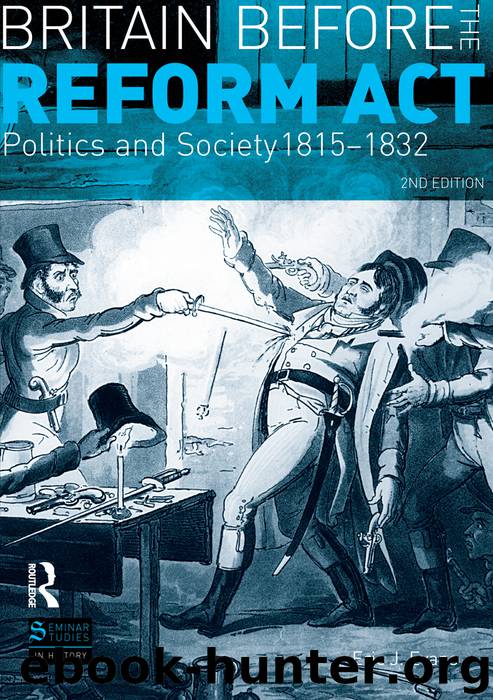Britain Before the Reform Act by Eric J. Evans

Author:Eric J. Evans [Evans, Eric J.]
Language: eng
Format: epub
ISBN: 9781317885467
Publisher: Taylor & Francis (CAM)
Published: 0101-01-01T00:00:00+00:00
THE METROPOLITAN POLICE
In popular recollection, of course, Peel is the politician who ‘created the police’. His names translate into the police’s most common nicknames in the nineteenth century: ‘Peelers’ or ‘Bobbies’. As so often, the truth is less dramatic and more subtle. The idea of a ‘preventive police’, whose functions would include not just catching offenders but deterring prospective criminals, had a long pedigree and as long a history of stern opposition. The parliamentary committee which Peel set up on becoming Home Secretary stated that ‘It is difficult to reconcile an effective system of police with that perfect freedom of action and exemption from interference which are the great privileges and blessings of society in this country’ (Halevy, 1926: 287). This vigorous defence of traditional liberties was buttressed during the French Wars by news of the distasteful centralism which Napoleon was visiting on the French. The English country gentleman, more vocal in Parliament on such questions than on any others except the price of corn, had both a xenophobic and a pragmatic dislike of bureaucracy, ‘codes’ and controls.
Peel, who had helped to create a Police Preservation Force in Ireland when Chief Secretary there, was better equipped than most politicians to see the advantages of professional policing but he did not envisage such forces outside London, whose population of 1.4 million in the 1820s was ten times as large as that of any other English city. It was also a city of migrants, transients and rootless persons. Though the statistics do not exist, it is a very strong probability that London housed a larger proportion of casual and unemployed labourers than any other. London was a special case, needing separate treatment. Elsewhere, until after the Municipal Corporations Act of 1835, the eighteenth-century system of local constables and watchmen survived. The onus of prosecution, if not necessarily arrest, was placed on the victim of a crime, not on the constable, so deterrence was very weak. London, however, had problems unique in scale if nothing else. They were highlighted by the rising crime figures. The historic City (with a mere 125,000 inhabitants) had a substantial force of watchmen and constables, as, by the 1820s, did some of the wealthy parishes in the metropolis. Elsewhere in the capital, population had massively outstripped the means of policing. Some administrative adjustments had been made immediately after the end of the war and by 1818 the Home Office had direct control over the Bow Street police force. This, however, was not considered large enough to cope with major outbreaks of crime or disorder.
Peel expanded the Bow Street force in 1822 by appointing 24 uniformed officers (known as ‘redbreasts’ because of the colour of their tunics) to patrol central London by day. More extensive solutions were required. As in other areas, Peel advocated controversial changes obliquely by appointing Select Committees dominated by government supporters. An initiative at the end of 1826 was frustrated when Liverpool’s government came to an end, but Peel took the issue up again on returning to the Home Office in February 1828.
Download
This site does not store any files on its server. We only index and link to content provided by other sites. Please contact the content providers to delete copyright contents if any and email us, we'll remove relevant links or contents immediately.
| Africa | Americas |
| Arctic & Antarctica | Asia |
| Australia & Oceania | Europe |
| Middle East | Russia |
| United States | World |
| Ancient Civilizations | Military |
| Historical Study & Educational Resources |
Room 212 by Kate Stewart(5091)
The Crown by Robert Lacey(4791)
Endurance: Shackleton's Incredible Voyage by Alfred Lansing(4743)
The Iron Duke by The Iron Duke(4337)
The Rape of Nanking by Iris Chang(4189)
Joan of Arc by Mary Gordon(4080)
Killing England by Bill O'Reilly(3987)
Say Nothing by Patrick Radden Keefe(3965)
I'll Give You the Sun by Jandy Nelson(3418)
Shadow of Night by Deborah Harkness(3343)
Hitler's Monsters by Eric Kurlander(3320)
Mary, Queen of Scots, and the Murder of Lord Darnley by Alison Weir(3189)
Blood and Sand by Alex Von Tunzelmann(3181)
Eleanor & Park by Rainbow Rowell(3141)
Darkest Hour by Anthony McCarten(3112)
Margaret Thatcher: The Autobiography by Thatcher Margaret(3068)
Book of Life by Deborah Harkness(2913)
Red Famine: Stalin's War on Ukraine by Anne Applebaum(2910)
The One Memory of Flora Banks by Emily Barr(2848)
